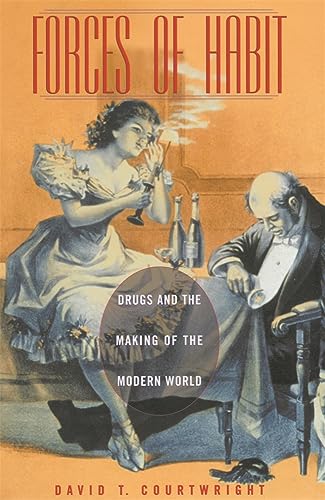Verwandte Artikel zu Forces of Habit: Drugs and the Making of the Modern...

Inhaltsangabe
Why are coffee, tobacco, and marijuana available the world over, but not peyote or qat? Why are alcohol and tobacco legal, but not heroin or cocaine? What drives the drug, and how has it come to be what it is today - a vast, chequered pattern of use and abuse, medicine and recreation, commerce and interdiction? A global history of the acquisition of progressively more potent means of altering ordinary waking consciousness, this book provides the big picture of the discovery, interchange, and exploitation of the planet's psychoactive resources, from tea and kola to opiates and amphetamines. Offering a social and biological account of why psychoactive goods proved so seductive, David Courtwright tracks the intersecting paths by which popular drugs entered the stream of global commerce. He shows how the efforts of merchants and colonial planters expanded world supply, drove down prices, and drew millions of less affluent purchasers into the market, effectively democratizing drug consumption. He also shows how Europeans used alcohol as an inducement for native peoples to trade their furs, sell captives into slavery, and negotiate away their lands, and how monarchs taxed drugs to finance their wars and expanding empires. This text explains why such profitable exploitation has increasingly given way, over the last hundred years, to policies of restriction and prohibition - and how economic and cultural considerations have shaped those policies to determine which drugs are readily accessible, which strictly medicinal, and which forbidden altogether.
Die Inhaltsangabe kann sich auf eine andere Ausgabe dieses Titels beziehen.
Über die Autorin bzw. den Autor
David T. Courtwright is Professor of History at the University of North Florida and author of Violent Land: Single Men and Social Disorder from the Frontier to the Inner City and Dark Paradise: A History of Opiate Addiction in America.
„Über diesen Titel“ kann sich auf eine andere Ausgabe dieses Titels beziehen.
EUR 8,55 für den Versand von USA nach Deutschland
Versandziele, Kosten & DauerNeu kaufen
Diesen Artikel anzeigenEUR 11,59 für den Versand von Vereinigtes Königreich nach Deutschland
Versandziele, Kosten & DauerSuchergebnisse für Forces of Habit: Drugs and the Making of the Modern...
Forces of Habit : Drugs and the Making of the Modern World
Anbieter: Better World Books, Mishawaka, IN, USA
Zustand: Very Good. Former library book; may include library markings. Used book that is in excellent condition. May show signs of wear or have minor defects. Artikel-Nr. 4675893-6
Anzahl: 1 verfügbar
Forces of Habit : Drugs and the Making of the Modern World
Anbieter: Better World Books, Mishawaka, IN, USA
Zustand: Good. Former library book; may include library markings. Used book that is in clean, average condition without any missing pages. Artikel-Nr. 4297546-6
Anzahl: 1 verfügbar
Forces of Habit : Drugs and the Making of the Modern World
Anbieter: Better World Books, Mishawaka, IN, USA
Zustand: Good. Used book that is in clean, average condition without any missing pages. Artikel-Nr. 5875331-6
Anzahl: 1 verfügbar
Forces of Habit: Drugs and the Making of the Modern World
Anbieter: Revaluation Books, Exeter, Vereinigtes Königreich
Hardcover. Zustand: Brand New. 1st edition. 277 pages. 9.50x6.50x1.00 inches. In Stock. Artikel-Nr. 0674004582
Anzahl: 1 verfügbar

